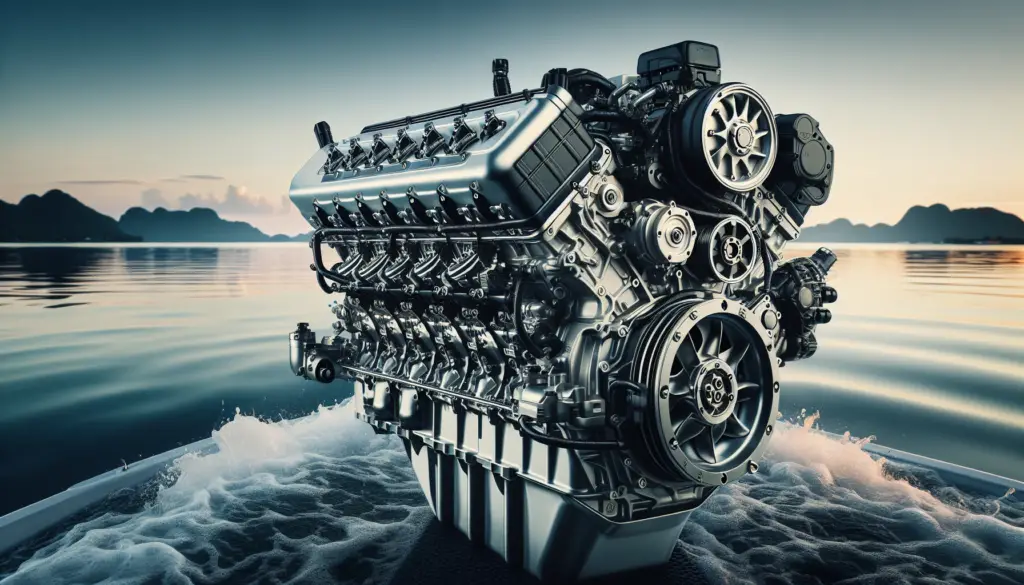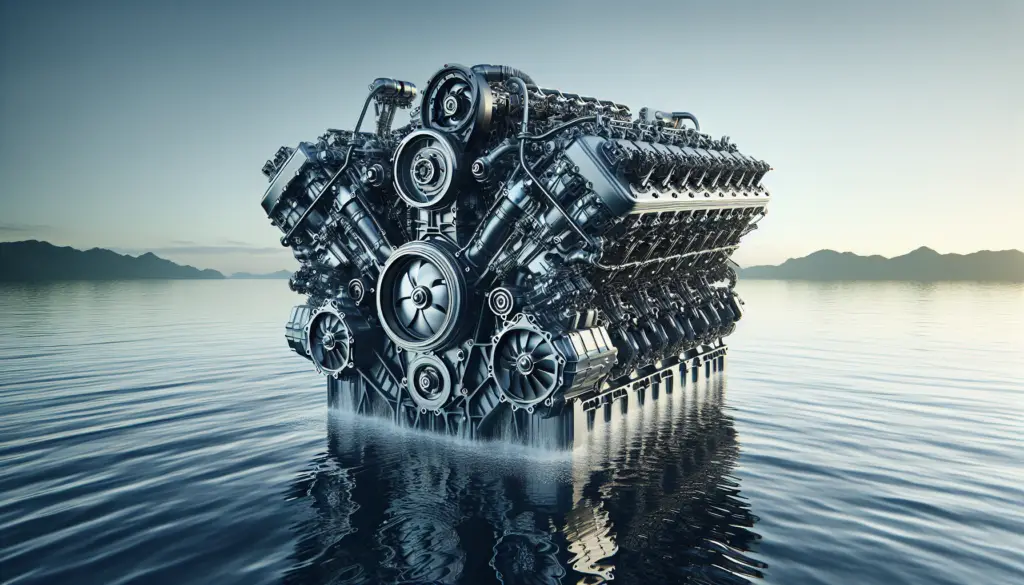Imagine yourself setting sail on a tranquil lake, equipped with the best fishing gear, but guess what’s missing in this picture-perfect scenario? You guessed it, the ideal boat engine! Before you embark on your next fishing adventure, consider “The Ultimate Buyer’s Guide To Boat Engines For Fishing Enthusiasts”. This guide is designed to equip you with the insight needed to choose the perfect powerhouse for your boat. It does not only touch on the basics of boat engines but also assists you in making an informed decision on the best one that suits your fishing style. Go ahead, keep reading, and set the stage for many successful fishing trips.

Understand the Importance of a Boat Engine
Whether you are a seasoned angler or a recreational fishing enthusiast, choosing the right boat engine plays a significant role in your fishing ventures.
Role of an Engine in Fishing
An engine powers your boat and essentially dictates your boat’s performance on water. It determines how quickly you get to your desired fishing spots and how steadily your boat can stay in those areas. Swift and efficient transitions between locations not only enhance your fishing trip but also provide better opportunities of catching fish.
Factors Influencing Engine Selection for Fishing
Choosing the right engine for fishing is not solely about selecting the most powerful one. It involves considering multiple elements such as the type of fishing you plan on doing, the size of your boat, the body of water you’ll be fishing in, and of course, your budget.
Importance of Engine Power in Relation to Boat Size
The size of your boat significantly influences the magnitude of the engine power you require. A larger boat typically commands a more powerful engine to ensure optimal performance. Conversely, smaller boats can do well with less powerful engines.
Types of Boat Engines
Boat engines come in several types, each with its unique features and suitable applications. Here’s an overview of the different kinds available.
Inboard Engines
Inboard engines are mounted inside the boat’s hull in a special engine room. They are typically used in larger vessels and provide excellent balance and stability.
Outboard Engines
These are the most common types of boat engines. Outboard engines are mounted on the stern of the boat, outside the hull. They’re popular due to their versatility, power range, and ease of maintenance.
Stern Drive Engines
Stern Drive engines, also known as inboard/outboard or I/O engines, combine characteristics of inboard and outboard engines. They come with an inboard engine connected to an outdrive at the stern, offering a balance of the benefits of both types.
Jet Propulsion Engines
Jet propulsion engines are slightly less common for fishing boats, but they offer unique advantages. They suck in water and force it out at high speed, propelling the boat forward. They are particularly suitable for shallow water bodies.
Outboard Engines
Outboard engines are widely preferred due to their many favorable attributes.
Types and Their Applications
Outboard engines come in a wide variety, offering varying horsepower to cater to different boat sizes and uses. Saltwater fishing often requires a more robust engine, whereas fresh water fishing can be accomplished with less power.
Pros and Cons
Outboard engines offer easy control, maintaining excellent maneuverability at both high and low speeds. Their design also aids in better weight distribution. However, they might not be as powerful as certain inboard models and might be a bit noisier.
Best Outboard Engines for Fishing
When it comes to fishing, some models stand out for their performance. Models like the Yamaha F25, the Mercury Verado Pro, and the Honda BF90 are considered excellent choices for this activity due to their superior performance, reliability, and high fuel efficiency.
Inboard Engines
Inboard engines are more common on larger vessels and have numerous appealing attributes.
Varieties and Applications
Just as outboards, inboard engines come in a range of sizes and power levels. They’re typically found in larger fishing boats and yachts due to their high power output and smoother operation.
Advantages and Disadvantages
Inboard engines offer superior power, allowing easier navigation in rough waters. They also provide more space on the boat as they’re installed inside the hull. However, they tend to be more difficult and expensive to maintain and repair.
Top Inboard Engines for Fishing Boats
For fishing enthusiasts who prefer inboard engines, some models stand out. Cummins marine diesel engines and Yanmar diesel engines are highly recommended for their power, efficiency, and long lifespan.

Stern Drive Engines
Stern drive engines offer a great balance between inboard and outboard engines.
Different Kinds and Usage
These engines come in different power ranges suitable for mid-sized to large boats. They offer a quiet, smooth operation, making them excellent for pleasure boating and extensive fishing trips.
Strengths and Weaknesses
Stern Drive engines have the advantage of offering more interior space, a low center of gravity for better stability, and easy propulsion system access for maintenance. However, they may not perform as well in shallow waters as outboards.
Recommended Stern Drive Engines for Fishing Enthusiasts
Some Stern Drive models are popular among anglers, including the MerCruiser Bravo Three and the Volvo Penta’s DuoProp, known for their power, efficiency, and low noise levels.
Jet Propulsion Engines
Jet propulsion engines are somewhat niche but offer many perks.
Distinguishing Features and Usage
Jet Propulsion engines work with no external propeller, making them safe and great for shallow waters. They’re prevalent in jet boats and personal watercraft but also find application in niche fishing scenarios.
Benefits and Drawbacks
Jet engines offer excellent acceleration and high top speeds. However, they might lack in efficiency and may not provide the same level of low-speed control compared to propeller systems.
Best Jet Propulsion Engines for Fishing
Selected models like the Rotax Marine with Jet Propulsion or Yamaha’s jet boat engines are popular for their dependable performance and relatively low maintenance.
Choosing the Right Engine Power
It is crucial to choose the right engine power for optimal boat performance.
Determining Necessary Horsepower
Determining the necessary horsepower involves considering your boat’s size, weight, and usage. If your fishing outings involve more cruising over long distances or in rough conditions, you’ll likely need a higher horsepower engine.
Effects of Underpowered or Overpowered Engines
An underpowered engine will strain to move the boat, leading to higher fuel consumption and a sluggish performance. Conversely, overpowering may degrade your boat’s balance and stability and could even damage the boat’s structure over time.
Matching Engine Power to Boat Size
Matching your engine power to your boat size is crucial for optimal performance and safety. The larger a boat, the more power it will need for efficient propulsion.
Fuel Efficiency and Emissions
Fuel efficiency and emissions are imperative aspects to consider, too.
Effect on Fishing Trip Duration
Fuel-efficient engines allow for longer trips and reduce overall operating costs. Thus, they can amplify your fishing experiences without burning a hole in your pocket.
Environmental Impact
Lower emissions mean less environmental impact, making eco-friendly engines a great choice for those conscious about their carbon footprint.
Most Fuel-Efficient Engines for Fishing Boats
If fuel efficiency is a vital concern, certain models like Honda’s BF series of outboard engines or Yanmar’s diesel inboard engines are renowned for their superior fuel efficiency.
Engine Maintenance and Longevity
Engine maintenance and longevity greatly influence your boat’s performance and your overall fishing experience.
Key Maintenance Steps
Regular maintenance involves tasks such as regularly changing the oil and filters, checking and replacing spark plugs, and inspecting for any signs of wear and tear. These steps ensure the engine runs smoothly and efficiently.
Typical Engine Lifespan
With regular maintenance and careful use, most boat engines can last for several years. However, the lifespan is highly dependent on the make and model of the engine and how well it’s been maintained.
Optimal Engine Options for Long-term Use
Engines from manufacturers like Mercury, Yamaha, and Honda, renowned for their durability and reliability, can be optimal for those looking at long-term use.
Final Recommendations
Choosing the Right Engine for Your Fishing Needs
Different types of fishing and boating scenarios require different engines. Therefore, understanding each type and their respective benefits is crucial in selecting the right engine suited to your specific fishing needs.
Balancing Power, Efficiency and Price
While power and efficiency are crucial, you should also find a balance with your budget. High-performance engines might seem appealing, but they might drive up not only your initial investment but your maintenance costs as well.
Investing in Maintenance for Engine Longevity
Regardless of the type or power of your engine, without proper regular maintenance, it can degrade faster than expected, reducing its efficiency and lifespan. Hence, investment in maintenance is key to securing your engine’s longevity and optimal performance.
In conclusion, choosing the right boat engine for fishing is a crucial decision with many variables to consider. It’s about understanding your needs and finding the right balance between power, efficiency, price, and eco-friendliness. With the right engine and regular maintenance, you’re all set to enjoy a superior and memorable fishing experience.

